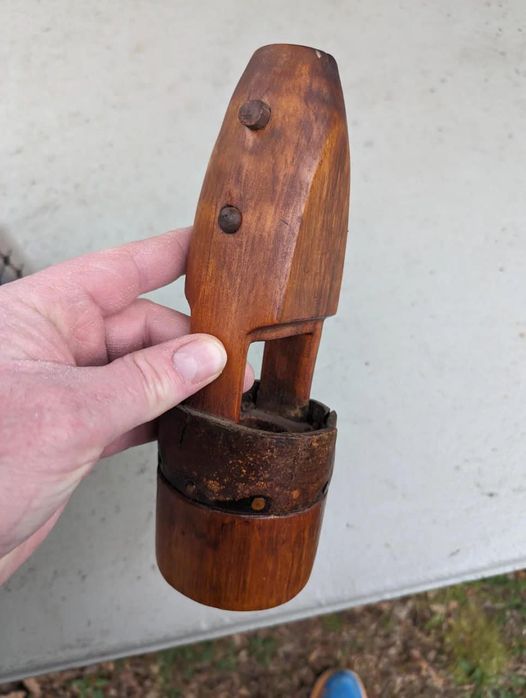
Discovery of the Object
When we bought our new house, we found an intriguing wood and leather object left behind. Determined to uncover its origins and purpose, we embarked on a fascinating journey of discovery.
Initial Thoughts
We’re in the Philadelphia area. Initially, we thought it might be boat-related, possibly an oar lock from an old rowing scull. However, it seemed too heavy for that purpose. The object, about 10″ tall and weighing around a pound, sat on a shelf, not near anything related. The band towards the bottom is leather, possibly with brass rivets.
Community Insights
Curious about its purpose, we turned to the community for opinions:
- Hand Pump Piece: Moves up and down to create a siphon.
- Water Pump Component: Leather swells to seal and create a vacuum.
- Shoe Stretcher: Maintains the shape of leather shoes.
- Air Pressure Device: Pushed through a tube with air pressure, based on the leather perimeter.
- Prosthetic Part: Part of an old prosthetic device.
- Correction: It’s ‘scull,’ not ‘skull’ in rowing terminology.
- Personal Anecdote: A comment about needing it for a pair of tight shoes.
- Foot Valve: From an old lift pump.
- Woodworking Mallet: Used for carpentry or chisel work.
- Shoe Stretcher: A vintage tool for leather shoes.
- Tool Handle: Possibly from an old-fashioned hammer or axe.
- Leatherworking Tool: For shaping or pressing leather.
- Boat Oar Lock: Secures and pivots the oar.
- Musical Instrument Piece: Part of a drum or maraca.
- Historical Artifact: A tool or device from an earlier period.
- Agricultural Implement: Used for farm tasks.
- Furniture Piece: Part of an antique chair or table.
- Maritime Equipment: Used for rigging or securing ropes on a ship.

Expert Opinions
Curiosity led us to consult experts. A local historian suggested it might be Victorian furniture, possibly a small bench or stool. An antique dealer believed it could be an early 20th-century footrest or ottoman.
The Breakthrough
Our breakthrough came at a museum specializing in historical furniture. The curator identified it as a “faldstool,” a portable folding stool dating back to medieval times. Originally used by clergy during services, faldstools later became popular in wealthy households. The intricate carvings indicated a late 19th-century revival style, while the leather seat confirmed its use as a practical piece of furniture.
Significance of the Faldstool
Learning about the faldstool’s history added context to our find. These stools symbolized status and mobility, often used by nobility and clergy. The presence of such an object in our home suggested the previous owners appreciated historical artifacts.

Restoration and Integration
We decided to restore the faldstool to its former glory, carefully cleaning and treating the wood and leather. It now holds a place of honor in our living room, serving as a unique conversation piece and a tangible link to the past.
Conclusion
The discovery of the wood and leather object turned out to be more than just an intriguing mystery; it was a journey into history and craftsmanship. The faldstool, with its rich heritage and intricate design, has become a cherished part of our household, adding depth and character to our everyday surroundings.
What do you think of Howie Mandel’s openness about his mental health? Please share your thoughts and help start the conversation!

Leave a Reply